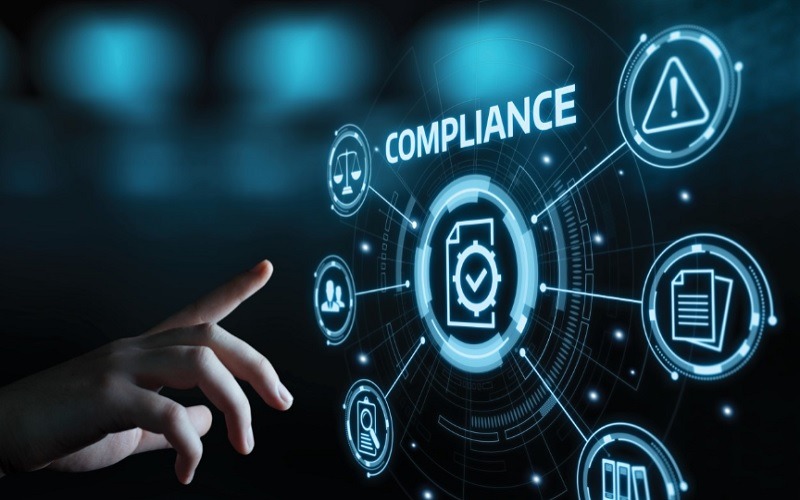It is impossible to stress the importance of thorough employee compliance training. With the intention of demystifying the complexity and exposing its extremely urgent necessity, we will start a detailed analysis of this crucial topic.
Employee compliance training cultivates a culture of trust and accountability among employees, while also teaching them how to obey rules and avoid dangers. We’ll look at the “whys” and “hows” of compliance training along the way, emphasizing its relevance in risk reduction, employee empowerment, and organizational profitability.
So fasten your seatbelt as we go on this exciting voyage. We will dispel common fallacies concerning employee compliance training by emphasizing the true advantages. It provides to both employees and the businesses they represent.
Understanding the Basics of Employee Compliance
Employee compliance is the observance of a set of rules, regulations, policies, and procedures at work by a worker. Companies lay down these rules and guidelines to make sure everyone’s playing fair.
They’re there to create a work environment that’s not just legal, but also moral and effective. That way, everything runs smoothly, folks respect each other more. We can all get our jobs done without any major hiccups or drama.
Here are some important things to consider:
- Types of Compliance: Employee compliance covers a wide spectrum of areas. Compliance with data privacy, anti-discrimination, and workplace safety regulations is necessary. For things like conduct, attendance, and dress code, internal standards are also addressed.
- Importance of Compliance: It keeps things organized and consistent throughout an organization. Employee adherence to these guidelines reduces the likelihood of accidents, conflicts, and legal issues. Additionally, it promotes a positive workplace environment.
Consequences of Non-Compliance: Failing to comply with workplace rules and regulations can lead to various consequences. Discipline, termination of employment, monetary penalties, damages to an employee’s reputation, and harm to the organization’s reputation are a few examples of these.
Legal and Ethical Frameworks: A Necessity for Every Organization
A company’s behavior is governed by legal and ethical frameworks, which make sure the company is operating within the law and upholding ethical standards. Here’s a detailed explanation:
Legal Framework
This includes all laws and rules that apply to how an organization does business, it also contains recruiting restrictions particular to the business, as well as more fundamental legal requirements like tax regulations and intellectual property rights.
Alright, here’s the deal: If you stick to these tips, you won’t just sidestep any legal drama. You’ll also win some serious respect from your crew, customers, and other businesses you’re working with.
So now imagine this: You’ve got a cool set of rules for how things work at your company. It covers all the laws related to running a business like yours – even tricky stuff like hiring practices and biggies such as tax codes and intellectual property rights.
Ethical Framework
Ethical frameworks are built on moral principles and values. They go beyond what is legally required and focus on what is right and just. So, you know how we’re always talking about doing what’s right? That’s basically the essence of ethical behavior. It’s all about being fair and open in everything we do.
Honesty isn’t just a policy; it’s a requirement for us to respect everyone around us – be it our team members, clients, or even people from our neighborhood. We have to live up to this standard not because someone is watching, but because it matters on its own terms!
This way, organizations create an environment where justice and integrity aren’t just buzzwords, they’re the real deal. A code of ethics or behavior that directs decision-making in accordance with these principles is frequently established by organizations.
Alignment with Organizational Values
To be effective, legal and ethical frameworks should align with an organization’s mission and values, when these frameworks are aligned with the company’s basic ideas, they become an important part of the corporate culture.
The Benefits of Compliance Training
Mitigating Risks: How Compliance Training Protects Your Business
Just like how a good movie gets all the details right from its book source, compliance training in business is pretty much the same deal, it’s about nailing every tiny detail to ensure your company isn’t taking any unnecessary risks.
When we dive into this stuff, it’s not just for kicks; there are actual legal consequences of stake here. So imagine you’re creating a mental picture of what these rules and regulations look like – characters representing different laws, events showing potential breaches…the works! Now translate that imagination into action.
That’s compliance training – helping your business avoid tripping over unseen hazards on the road to success. Sure, compliance training is like your business’s shield, it arms your team with what they need to know, so they can sidestep issues before they even pop up. Think of it as the coach teaching them all the rules of the game – industry norms, company policies, and legal stuff too.
Empowering Employees: The Positive Impact on Workforce Morale and Efficiency
Empowerment is the foundation of a productive workplace, and compliance training is crucial to this. When employees are informed on the rules and regulations governing their job, they gain confidence in their capacity to make judgements, this self-assurance thus leads to improved morale and job satisfaction.
In addition to increasing production, compliance training reduces the likelihood of mistakes and rework brought on by noncompliance, employees who understand compliance are better equipped to carry out their responsibilities effectively and contribute positively to the success of the organization.
Fostering a Culture of Responsibility and Trust
Compliance training extends beyond mere rule enforcement; it fosters a culture of responsibility and trust within the organization. Employees are more likely to comply when they understand how crucial it is and when they observe leadership proactively advocating and upholding ethical norms.
Employees are then inspired to assume responsibility for their choices and behaviors as a result. In such a setting, trust is encouraged since employees are assured that they are part of a company that is dedicated to upholding moral principles. The culture of responsibility and trust at this organization enhances its reputation and makes it an attractive place to work and do business.
Crafting an Effective Compliance Training Program
Designing Tailored Training Modules
One size rarely fits all, especially when it comes to compliance training. Effective programs recognize that each organization has unique compliance requirements and employee needs. Tailored training modules are designed to address these specific demands.
Before determining the areas in which staff members require instruction, they first assess the regulatory requirements of an organization. Businesses may make sure that their staff members have the information and abilities required to successfully traverse the intricacies of compliance by producing interesting and current material. For industries like healthcare, where compliance is critical, utilizing the best healthcare LMS can streamline the training process. These systems provide customized learning experiences, ensuring employees receive the most relevant and up-to-date compliance education tailored to their roles.
Utilizing Technology for Efficient Training Delivery
LMS compliance training software plays a pivotal role in making compliance training more efficient and accessible, a dynamic platform for the distribution of training materials.
Employees may access training courses whenever it’s convenient for them, whether they’re in the office or not, this adaptability not only takes into account different learning preferences but also enables employees to go at their own speed, improving understanding and retention.
Technology also makes it possible to track and record staff growth, ensuring that compliance requirements are satisfied and speeding up compliance audits.
Conclusion
Technology’s role in shaping how we work together, learn new things. Grow professionally can’t be overstated, it’s like the lifeblood of the modern workplace experience. We’re not just talking emails or video calls here.
Think broader – interactive learning platforms, team collaboration tools that make us feel connected even when we are miles apart, digital mentorship programs. The list goes on! These technological wonders have revolutionized our professional lives, for sure.
Technology is fast becoming a basic need in workplaces worldwide because it underpins all those higher-order experiences – teamwork, growth opportunities, and ultimately job satisfaction. So what does this mean? Simply put – organizations have to get along with it if they want to keep their employees engaged and happy at work.



